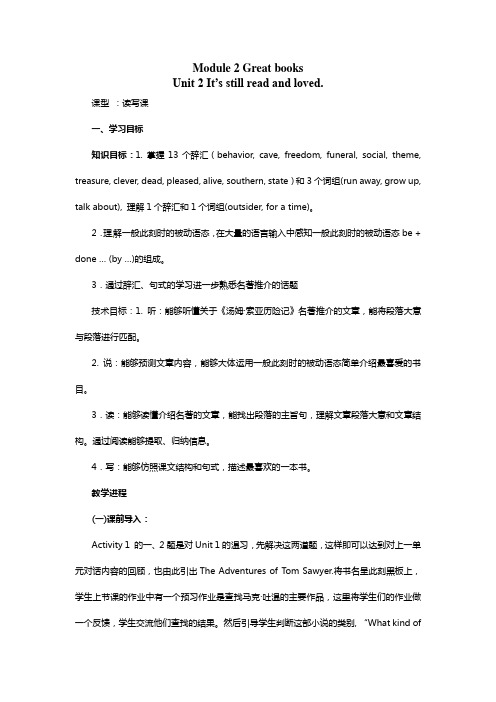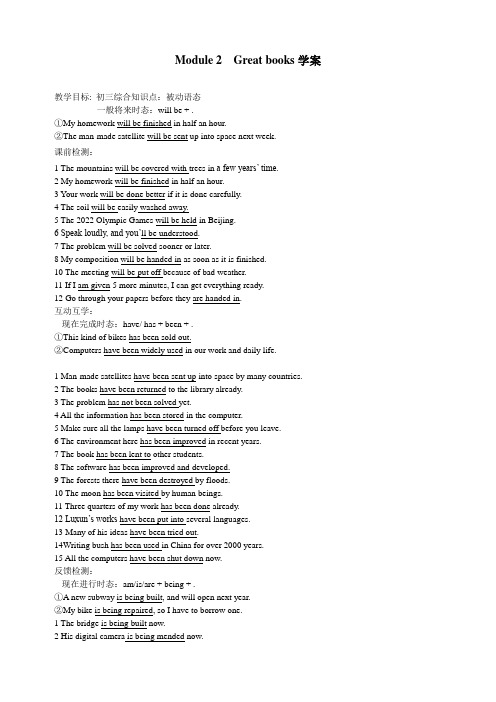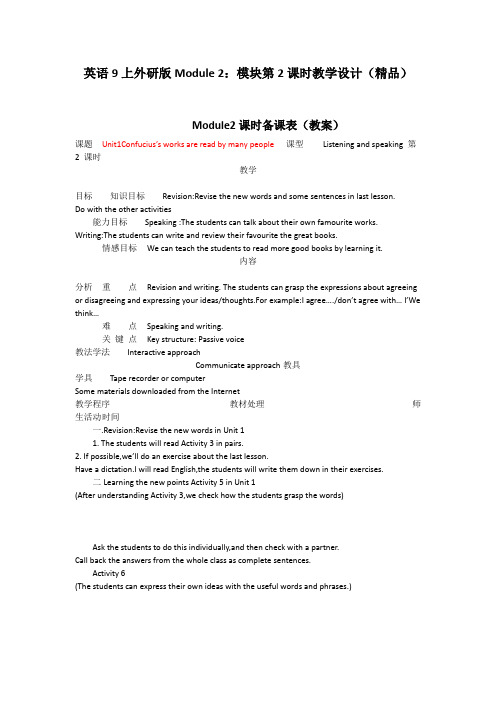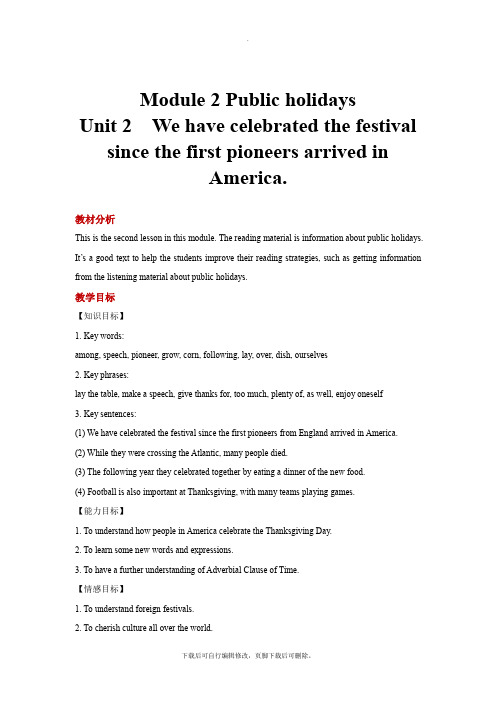外研版九年级英语上册 Module 2 Unit 2 学案(无答案)
外研版九上Module2Unit2It’sstillreadandlovedword导学案

Module 2 Great booksUnit 2 It’s still read and loved.课型:读写课一、学习目标知识目标:1. 掌握13个辞汇(behavior, cave, freedom, funeral, social, theme, treasure, clever, dead, pleased, alive, southern, state)和3个词组(run away, grow up, talk about), 理解1个辞汇和1个词组(outsider, for a time)。
2.理解一般此刻时的被动语态,在大量的语言输入中感知一般此刻时的被动语态be + done … (by …)的组成。
3.通过辞汇、句式的学习进一步熟悉名著推介的话题技术目标:1. 听:能够听懂关于《汤姆·索亚历险记》名著推介的文章,能将段落大意与段落进行匹配。
2. 说:能够预测文章内容,能够大体运用一般此刻时的被动语态简单介绍最喜爱的书目。
3.读:能够读懂介绍名著的文章,能找出段落的主旨句,理解文章段落大意和文章结构。
通过阅读能够提取、归纳信息。
4.写:能够仿照课文结构和句式,描述最喜欢的一本书。
教学进程(一)课前导入:Activity 1 的一、2题是对Unit 1的温习,先解决这两道题,这样即可以达到对上一单元对话内容的回顾,也由此引出The Adventures of Tom Sawyer.将书名呈此刻黑板上,学生上节课的作业中有一个预习作业是查找马克·吐温的主要作品,这里将学生们的作业做一个反馈,学生交流他们查找的结果。
然后引导学生判断这部小说的类别, “What kind ofnovel is The Adventures of Tom Sawyer?”答案是“Adventure story.”这一部份可按照学生的实际情况增加书的类别介绍并给出例子,如:love story: Romeo and Juliet, tragedy: King Lear, comedy: Merchant of Venice,histories: Henry VIII 等等。
外研版英语九上Module 2《Public holidays》(Unit 2)教学设计

外研版英语九上Module 2《Public holidays》(Unit 2)教学设计一. 教材分析《Public holidays》(Unit 2)是外研版英语九上Module 2的教学内容。
本节课主要讨论公共节日的习俗和庆祝方式。
通过学习本节课,学生可以了解不同国家的公共节日,提高跨文化交际意识。
教材内容丰富,包括阅读材料、词汇、语法和听力练习等,为学生提供了全面的语言输入。
二. 学情分析九年级的学生已经具备了一定的英语基础,能够听、说、读、写简单的英语句子。
然而,他们在阅读和写作方面还存在一定的困难,特别是对于长篇文章和复杂语法的理解。
此外,学生对于不同国家的文化了解有限,需要通过本节课的学习来拓宽视野。
三. 教学目标1.知识目标:学生能够掌握与公共节日相关的词汇和表达方式,了解不同国家的节日习俗。
2.能力目标:学生能够听、说、读、写关于公共节日的文章,提高跨文化交际能力。
3.情感目标:学生能够尊重和理解不同国家的文化差异,培养全球视野。
四. 教学重难点1.重点:公共节日的词汇和表达方式,不同国家的节日习俗。
2.难点:对于长篇文章的理解,复杂语法的运用。
五. 教学方法1.交际法:通过小组讨论、角色扮演等形式,让学生在实际语境中运用所学知识。
2.任务型教学法:通过完成各种任务,激发学生的学习兴趣,提高学生的综合语言运用能力。
3.文化导入法:介绍不同国家的节日习俗,帮助学生了解跨文化差异。
六. 教学准备1.教师准备:提前准备好与公共节日相关的教学材料,如PPT、阅读文章、词汇表等。
2.学生准备:学生提前预习课文,了解本节课的学习内容。
七. 教学过程1.导入(5分钟)教师通过提问方式引导学生谈论他们喜欢的节日,激发学生的学习兴趣。
例如:“What is your favorite holiday? Why?”学生分享自己的经历,从而引出本节课的主题。
2.呈现(10分钟)教师展示PPT,呈现与公共节日相关的词汇和表达方式,如“Christmas, New Year, Easter, Dragon Boat Festival”等。
新外研版九年级上册英语 Module 2 Unit 2 教案(教学设计)

Module 2 Public holidaysUnit 2 We have celebrated the festival since the first pioneers arrived in America.单词among, speech, pioneer, grow, corn,1. To master the new words.2. To learn some expressions about Thanksgiving.3. To learn the adverbial clause of time.1. To get information from the article.2. To write a composition by using the adverbial clause of time.Step 1情景导入1.The teacher shows the pictures of Thanks giving and asks questions.T:Which festival is this?S:Thanksgiving.T:Great. When is it celebrated, do you know?S:On the fourth Thursday in November.T:Do you want to know how it is celebrated?S:Yes.T:Now let\'s look at the pictures and learn about it.2.T:Last period, we read the passage about Thanksgiving. We learn about its facts. Can you tell me its date, meaning, history and celebration?S1:…S2:…T:You may forget some of the facts. You should read the passage again.Step 2完成教材 Activity 1的任务和教材 Activities 3,4的任务。
英语初三上外研版module2:unit2优秀学案

英语初三上外研版module2:unit2优秀学案Module2Unit2It’sstillreadandloved.一教学目标:Keywords:adventure,behavior,cave,freedom,funeral,century,ou tsider,pretty,social,theme,treasure,clever,dead,hide-hid-hidden,pleased,alive,punish,state,southernKeyPhrases:attheendof,runaway,growup,talkaboutGrammar:一般现在时的被动语态二教学重难点:一般现在时的被动语态三复习回忆用括号里的词的适当形式填空1.theGrandCanyonthegreatestwonderanywhereinthenaturalworld?〔be〕2.SheoftenwiththebandCrazyFeet.(sing)3.Weameetingnow.(have)4.Shetoourschoolyesterday!(go)5.Itatthatmoment.(rain)6.Idownsomeideasalready.(write)7.IaninterviewwithBeckyWangtomorrow!(do)四课前预习英语的语态是通过动词形式的变化表现出来的。
英语中有两种语态:主动语态和被动语态。
主动语态表示主语是动作的执行者。
例如:ManypeoplespeakChinese.谓语:speak的动作是由主语manypeople来执行的。
被动语态表示主语是动作的承受者,即行为动作的对象。
例如:Chineseisspokenbymanypeople.主语English是动词speak的承受者。
被动语态由“助动词be+及物动词的过去分词”构成。
人称、数和时态的变化是通过be的变化表现出来的。
外研版英语九年级上册Module 2 Unit 2 教学设计

如有疑问,请联系网站底部工作人员,将第—时间为您解决问题!文件预览:Module 2 PublicholidaysUnit 2 We havecelebrated the festival since the first pioneers arrived in America. 教学目标(知识目标)Key vocabulary and key structures(能力目标)To get information about ThanksgivingTo master the adverbial clauses of time(感情态度目标)To know more about western festivals andrespect other festivals and western culture.教学重难点(教学重点)1. To master the new words.2. To learn some expressions aboutThanksgiving.3. To learn the adverbial clause of time.(教学难点)1. To get information from the article.2. To write a composition by using theadverbial clause of time.教学过程Step 1 Warming upAnswer the questionsaccording to the pictures, and let Ss know about Thanksgiving.What festival do you think it isWhenis Thanksgiving celebrated Do families come together to celebrate the festivalDo you enjoy the parade in the streetStep 2 Presentation the newwords and expressionsLook and say. Theteacher shows the pictures of new words or expressions, and let the students tosay as quickly as possible.1. corn n. 谷物; 玉米 2. dish n. 盘; 碟3. parade n. (庆祝) 游行4. the Young Pioneers少先队员Li Dazhao was a pioneer of theChinese revolution. 李大钊是中国革命的先驱。
外研版英语九年级上册模块2,Unit 2 读写教案

Module2 Pubic holidaysUnit1 My family always go somewhere interesting as soon asthe holiday begins(听说课教案)Ⅰ、Teaching model:Listening and speakingⅡ、Teaching method:Communicative approachⅢ、Teaching Objectives●Knowledge objectiveKey vocabulary:found.since then.flag.until.off.all kinds of .vacation .take a vacation. season. kid. have fun. band .UK. as soon as.fourth.sixth.seventh.eighth.ninth.tenth.twentieth.twelfth.Key structures:●Ability objective1. To listen and understand sentences with adverbial clauses.2. To understand the conversation.3. To learn to use dates●Moral objective1.To talk about Chinese public holidays.2. To develop the ability to cooperate with others.Ⅳ、Teaching importance and difficulty1. To learn about some expressions in the passage.2. To learn to use adverbial clausesV、Teaching methodPWP method, task-based methodVI、Teaching aidsA tape recorder, multimedia and some picturesⅦ、Teaching ProceduresLearning Aims (学习目标)1.To listen and understand the conversation with adverbial clauses.2.. To learn to use the patterns with adverbial clauses correctly:…after.as soon as .before. since. until .when. while3. To talk about public holidays.4. To remember the words and expressions(师傅学友明确学习任务)Step 1: Check the new words . (学习单词)1.师友朗读found.since then.flag.until.off.all kinds of .vacation .take a vacation. season. kid. have fun. band .UK. as soon as.fourth.sixth.seventh.eighth.ninth.tenth.twentieth.twelfth.(师傅注意学友的发音)2.教师检查Task1:请快速说出你看到的单词(师友举手抢答)Step 2: Talk and learn.(学习对话)I.师友听读感知1)Look and talk about the picture.(Activity 1)2)Complete the sentences with the dates(Activity2)(先自主完成再互助交流)3)Listen and check.(先自主完成再互助交流)4)Listen to the passage and pay attention to the pronunciation.5)Read again and complete the table.(Activity3)(先自主完成再互助交流)( 1)学友自主在课文中找到每日英语原句勾画出来When is your national day?Do you have any plans for?We only have one day off.( 2)学友读给师傅听,互助交流用法。
外研九年级上册Module2Unit2导学案(无答案)

Module 2 Unit 2 We have celebrated the festivalsince the first pioneers arrived in America.班级:___________ 姓名:______________ 【自主预习】一、单词拼写1.摆放(餐桌) v._________2.演说,讲演n.___________3.[paɪə'nɪə] n.___________4.种植,栽植v.___________5.[kɔːn] n._________6.接下来的adj.______________7.游行n._____________8.完了的,结束的adj._________9.盘,碟n.___________ 10.[aʊə'selvz] pron.__________11.[ə'mʌŋ]prep._________【数词学习】请根据基数词写出相对应的序数词。
二、短语翻译1.11月份的第四个周四_____________________________2.做简短的演讲_________________3.一年一次_____________________4.我们玩得开心_________________5.表示感谢_____________________6.很多、大量___________________7.讲故事_______________________8.也,有_______________________9.乘船_________________________10.到达_________________________11.最拥挤的房间_____________________________12.在第17世纪__________________13.种植玉米_____________________14.摆餐桌_______________________15.洗刷餐具_____________________16.第二年_______________________17.一桌子的新食物_______________________________三、句子翻译1.人们在每年十一月的第四个星期四庆祝它。
Module2Unit2.(新教案)-2023-2024学年九年级上册英语(外研版)

1.理论介绍:首先,我们要了解一般过去时态的基本概念。一般过去时态是用来描述过去发生的动作或状态。它是英语时态中的重要组成部分,帮助我们准确描述过去的事情。
2.案例分析:接下来,我们来看一个具体的案例。文章中的角色是如何用一般过去时态描述他们的节日经历的,以及这个时态是如何帮助我们理解他们的故事。
3.成果分享:每个小组将选择一名代表来分享他们的讨论成果。这些成果将被记录在黑板上或投影仪上,以便全班都能看到。
(五)总结回顾(用时5分钟)
今天的学习,我们了解了一般过去时态的基本概念、重要性和应用。通过实践活动和小组讨论,我们加深了对这一时态的理解。我希望大家能够掌握这些知识点,并在描述过去的事情时能够灵活运用。最后,如果有任何疑问或不明白的地方,请随时向我提问。
2.在新课讲授过程中,我尽量用简洁明了的语言解释一般过去时态的概念和用法。通过案例分析,让学生在实际语境中感知一般过去时态。但从学生的反馈来看,对于不规则动词过去式的记忆仍然是他们的难点。为此,我将在下一节课中尝试使用更多有趣的记忆方法,帮助学生克服这一困难。
3.实践活动中,学生分组讨论和写作练习的环节较为顺利。大部分学生能够运用一般过去时态进行描述,但仍有个别学生存在语法错误。在今后的教学中,我将加强对学生的个别辅导,关注他们的写作过程,提高他们的语言表达能力。
-一般过去时态的肯定句、否定句和疑问句结构;
-使用一般过去时态描述过去发生的事情。
2.词汇:学习并运用以下词汇:
- family, holiday, visit, museum, traditional, celebrate, custom, present, occasion3.对话理解:理源自并运用以下对话中的句型和表达方式:
最新外研版九年级上册英语Module 2 Unit 2(导学案)

Module 2 Public holidaysUnit 2 We have celebrated the festival sincethe first pioneers arrived in America.一、学习目标:目标A:认读、理解本课的词汇、短语及句型。
目标B: 读懂公共假期-感恩节的文章。
目标C: 学会带感情的朗读及断句。
目标D: 学习如何写关于“节日”话题的问章。
二、问题引领:问题A:认读、理解本课的词汇、短语及句型。
(检查预习内容:翻译重点短语。
①小组合作互查重点短语翻译,学师帮助学友纠正发音。
②抢答环节:抢答翻译下列重点短语。
)1. 发表演讲____________________2. 对某事表示感谢___________________3. 摆设餐具____________________4. 一年一次__________________________5. 也________________________6. 洗碗_____________________________7. 丰富的;充足的_____________ 8. 沿着......前进______________________9. 下一年______________________ 10.过得愉快_________________________11. 在十七世纪_____________________12. 太多_________________________13. 开始做某事______________________14. 讲故事_________________________问题B: 读文章并完成各项任务。
(速读并理解题干,带着问题去读文章。
)I、Skimming reading (略读)1. 听录音,完成下面的两个问题。
(独立完成,学友汇报,学师补充纠错。
注意划线词部分。
)1) Which country celebrates Thanksgiving ? ______________________________.2) When do people celebrate Thanksgiving ?__________________________________.2. 默读文章,将主要信息与各段落匹配。
外研版九年级上册 Module 2Unit2 教学设计

外研版九年级上册Module 2Unit2 教学设计M2U2 We have celebrated the festival since the first pioneers arrived in AmericaTeaching aims :1.You are able to know the new words and phrases mentioned in the passageAmong family and friendsMake short speechesNative AmericansLay the tablePlenty of other thingsOn televisionEnjoy ourselves2. You are able to know the origin of Thanksgiving Day and the customs, and learn to give thanks to others.3. Repeat the passage in your own wordsTeaching key and difficult pointsUse the phrases freelyRepeat the passage in your own wordsTeaching procedures:Step1: lead inToday we’ll still talk about a holiday from America, maybe most of you heard it, Thanksgiving Day, but do you know whom they are giving their thanks to Please follow me to go into this traditional American holiday. Step2: assignmentsAssignment 1: Check the assignments I gave you before class.Words and phrases:·among(family and friends)·Make short speeches·The 1st pioneers·The Native Americans·Prepare the food·The Atlantic·A traditional dinner·Lay the table·Wash the dishes·Macy’s Thanksgiving Day Parade enjoy ourselvesTranslation·It is celebrated on the 4th Thursday in November.·Give thanks for their food.·The parade goes along several streets·Football is also important at Thanksgiving, with many team playinggames.·We usually watch the games on television and enjoy ourselves very much.Assignment2: read the passage twice and finish the mind-map. Assignment3: read again and complete the table according to the mind-mapFacts about ThanksgivingDate _____________________________Meaning ________________for their foodhistory ·Have celebrated it since _________from England arrived in America.·Learnt from the Native Americans how to __________ and celebrated together by __________ of the new food.Celebration ·Celebrate with _______________________ before dinner·Celebrate by watching _________ in New York City and _____on television.Assignment4: speakingTry to repeat the passage from 3 aspects: (three students)When and whereOriginCelebrationYou can start like this: Thanksgiving Day is an American festival, it is celebrated on __________...........Another three students: you can talk about a holiday you are familiar with, you can talk about it from three aspects or other aspects Assignment 5: homeworkFinish exercise 5 on your homework bookWrite down the description about the Thanksgiving Day or other festival you are familiar with you showed in class.whereWhenactivitiessinceDied oforiginThanksgiving DayThe Native AmericanOn televisionNew York CityCelebrationactivitiesoverbeforecelebratetoday。
外研九上Module2Unit2导学案

Module 2Unit 2 导学案学习目标:掌握本单元词汇、短语预习检测:词汇:在…之中__________ 演讲__________ 开拓者__________ 种植__________接下来的___________ 谷物__________完了的___________摆放_________盘碟_______________游行___________我们自己__________短语:摆放桌椅________________做演讲____________________第二年_________________ 充足的_________________为…而感恩________________ 怎样种玉米_____________ 一年一次_______________讲故事___________________ 过得开心_______________ 合作探究:一、between/amongamong一般用于三者或三者以上的“在……中”between一般指两者之间,或者是由and连接的两个人或物。
1. There was a fight ________the two boys.这两个孩子打过一次架。
2. I’m usually free_ ________ Tuesday and Thursday.3. They hid themselves ___________ the trees.二、根据句意及汉语提示填写单词。
1. The small village is ________ (在……之中)the mountains.2. Our head teacher will make a ______ (讲演) at the school meeting thisafternoon.3.Boys and girls, you’d better write down the______ (接下来的) sentencescarefully.4. Peter never helps me wash d______ after dinner。
Module2Unit2教学设计2023-2024学年外研版英语九年级上册

2. 多样化教学方法:为了提高学生的学习兴趣和参与度,我计划采用更多的教学方法,如情景模拟、小组合作等,以促进学生的主动学习和思考。
3. 多元化教学评价:为了更全面地评价学生的学习成果,我计划采用多元化的评价方式,如课堂表现、作业完成情况、小组合作等,以更全面地反映学生的学习成果。
三、教学难点与重点
1. 教学重点:
(1)词汇:本节课涉及的重点词汇有celebrate, festival, tradition, family gathering等,教师需要引导学生正确理解和运用这些词汇。
(2)语法:本节课主要学习一般现在时,教师需要通过例句和练习帮助学生掌握一般现在时的构成和用法。
- 角色扮演:学生模拟不同角色,用英语对话表演节日庆祝场景,增强口语表达能力。
- 听力练习:播放节日相关的英语听力材料,让学生练习听力理解和口语应答能力。
- 游戏互动:设计“节日猜谜”等游戏,让学生在轻松愉快的氛围中学习节日知识。
- 小组竞赛:开展节日知识问答竞赛,激发学生的学习兴趣和竞争意识。
3. 确定教学媒体和资源的使用:
本节课的核心素养目标包括:
1. 语言能力:通过听、说、读、写的实践活动,提升学生运用英语进行有效沟通的能力。
2. 文化意识:通过学习西方节日和文化习俗,使学生了解中外文化的差异,培养学生的跨文化交际能力。
3. 思维品质:通过分析、比较不同的节日和文化习俗,发展学生的逻辑思维和批判性思维能力。
4. 学习能力:通过自主、合作、探究的学习方式,培养学生主动学习和合作学习的能力。
9. 鼓励学生相互交流和分享作业经验,提高他们的合作意识和学习能力。
外研版英语九上Module2学案2

Module 2 Great books学案教学目标: 初三综合知识点:被动语态一般将来时态:will be + .①My homework will be finished in half an hour.②The man-made satellite will be sent up into space next week.课前检测:1 The mountains will be covered with trees in a few years’ time.2 My homework will be finished in half an hour.3 Your work will be done better if it is done carefully.4 The soil will be easily washed away.5 The 2022 Olympic Games will be held in Beijing.6 Speak loudly, and you’ll be understood.7 The problem will be solved sooner or later.8 My composition will be handed in as soon as it is finished.10 The meeting will be put off because of bad weather.11 If I am given 5 more minutes, I can get everything ready.12 Go through your papers before they are handed in.互动互学:现在完成时态:have/ has + been + .①This kind of bikes has been sold out.②Computers have been widely used in our work and daily life.1 Man-made satellites have been sent up into space by many countries.2 The books have been returned to the library already.3 The problem has not been solved yet.4 All the information has been stored in the computer.5 Make sure all the lamps have been turned off before you leave.6 The environment here has been improved in recent years.7 The book has been lent to other students.8 The software has been improved and developed.9 The forests there have been destroyed by floods.10 The moon has been visited by human beings.11 Three quarters of my work has been done already.12 Luxun’s works have been put into several languages.13 Many of his ideas have been tried out.14Writing bush has been used in China for over 2000 years.15 All the computers have been shut down now.反馈检测:现在进行时态:am/is/are + being + .①A new subway is being built, and will open next year.②My bike is being repaired, so I have to borrow one.1 The bridge is being built now.2 His digital camera is being mended now.3 Many trees are being cut down around the world.4 The wild animals are being protected well.5 This kind of machine is still being used now.。
外研版英语九上Module2Unit2学案

Module 2 Great BooksUnit 2 It’s still read and loved.The Adventures of Tom SawyerHere is our monthly article on a favourite great book. This month, our guest writer is Mr. Jackson.My favourite great book is The Adventures of Tom Sawyer by Mark Twain. Tom lives with his aunt Polly in the quiet streets of St. Petersburg, Missouri. He’s a lively and clever young boy, and he finds himself in many exciting adventures. He runs away with his two friends, Huck Finn and Joe, to an island in the middle of the Mississippi River for several days. With Huck he goes looking for treasure, with Becky he gets lost in a cave, and finally, they find a box of gold.find oneself 发现了自己才能所在(能胜任某种工作)lively adj. 活泼的,栩栩如生的eg. a lively descriptionalive adj. 活着的, 活泼的eg. The fish we caught is still alive.get lost 迷路My favourite scene in the book is when everyone thinks Tom is dead. He decides to go to his own funeral. He hides and watchesn. 葬礼,出殡for a time, and then suddenly he appears. Everyone is surprised to (for a time = for a period of time)see him but they’re also pleased to see him alive.surprised adj. 感到惊讶的eg. I was surprised to see him there.surprise vt. 使惊奇, 奇袭eg. You surprise me!surprising adj. 令人惊讶的eg. surprising newsTom is the hero of the story, but there are other important characters. Huck is an outsider and everyone is afraid of him. Becky is pretty with fair hair, Joe is Tom’s best friend, and Injun Joe is the bad man of the story.hero——主人公character 人物outsider 旁观者The themes of the story are to do with children growing up and becoming more serious. It describes how strangers are seen in small towns of America. Finally, it talks about freedom, social rules and how people are punished for bad behaviour.do with 处理/ 解决grow up v 长大,成长freedom n. 自由free adj. 自由的,免费的vt. 使自由Why do I think Tom Sawyer is a great book? Mark Twain wrote the storyin1876, but it’s still read and loved by people all over the world today. And although it’s only a story, Twain wrote it in the everyday English of the Southern states of America in the 19th century, so it sounds very real. Today it’s thought to be one of the greatest books in American literature. Go on--- read it! I know you’ll enjoy it, too.it’s thought to 被认为是被动语态的用法1. 构成:主语(动作接受者)+ be + 及物动词的过去分词 +(by + 动作执行者)2. 句型:肯定句:主语 + be + 过去分词 + (by+ 动作执行者)否定句:主语 + be not + 过去分词 + (by+ 动作执行者)一般疑问句:Be + 主语 + 过去分词 + (by+ 动作执行者)特殊疑问句:特殊疑问词 + be + 主语 + 过去分词 + (by+ 动作执行者)【典型例题】1. “ Hi, Tom. _______(怎么了)Why are you crying? ” “I hurt my left leg.”2. There are four ______(名著)in Chinese literature.3. _________(就……而言)I know, he has been to Beijing twice.4. It is 5:00 p.m.; we will _______(不再)wait for him.5. _______(数百万计)Beijingers are learning English.答案:1. What’s up?2. works3. As far as4. not any more5. Millions of内容总结。
英语九年级上外研版module2:模块第2课时教学设计(精品)

英语9上外研版Module 2:模块第2课时教学设计(精品)Module2课时备课表(教案)课题Unit1Confucius’s works are read by many people 课型Listening and speaking 第2 课时教学目标知识目标Revision:Revise the new words and some sentences in last lesson.Do with the other activities能力目标Speaking :The students can talk about their own famourite works. Writing:The students can write and review their favourite the great books.情感目标We can teach the students to read more good books by learning it.内容分析重点Revision and writing. The students can grasp the expressions about agreeing or disagreeing and expressing your ideas/thoughts.For example:I agree…./don’t agree with… I’We think…难点Speaking and writing.关键点Key structure: Passive voice教法学法Interactive approachCommunicate approach 教具学具Tape recorder or computerSome materials downloaded from the Internet教学程序教材处理师生活动时间一.Revision:Revise the new words in Unit 11. The students will read Activity 3 in pairs.2. If possible,we’ll do an exercise about the last lesson.Have a dictation.I will read English,the students will write them down in their exercises.二Learning the new points Activity 5 in Unit 1(After understanding Activity 3,we check how the students grasp the words)Ask the students to do this individually,and then check with a partner.Call back the answers from the whole class as complete sentences.Activity 6(The students can express their own ideas with the useful words and phrases.)Activity 7Make a list of:Students work in pairs to do this.Call back suggestions from the whole class.Make columns on the board if I wish.Players:William ShakespearThinkers:ConfuciusWriters:LaosheAsk them to read through the passage by themselves a couple of times.教学程序教材处理师生活动时间三:Pronunciation and speakingActivity 8(They can express their own ideas about something and they can use “I agree/don’t agree with (I)think…”correctly.Actvity 9Some exercises in the WB Group the students to decide what they think about the three statements.Ask them to write down their ideas,and appoint a secretary to report back.At the same time ask the students to pay attention to expressing their agreeing or disagreeing about their ideas or review the great books.Call back the group’ ideas in a whole-class setting,and try to get a discussion going.If we have some time,we’ll do with some exercises in the WB and check the answers with the whole class.板书设计Module 2 Great BooksUnit 1 Confucious’ works are read by many people.(2)The Passive voice: be+p.p The teaching points:一般现在时的被动语态: 1.be known for…Am/is/are/+p.p 2.players/thinkers/writers1.______2.______教学后记。
外研版九年级英语上册教案Module 2 Unit 2

Module 2Unit 2 We have celebrated the festivalsince the first pioneers arrived inAmerica.本单元是一节读写课,课文内容详细介绍了美国感恩节的来历,人们庆祝的方式及其意义。
通过学习课文学生可以学会怎样去介绍一个节日。
教学中,教师要引导学生关注时间状语从句,并让学生学会按提示获取重要信息的能力。
【知识目标】1、让学生学会使用本课的单词,重点是关于感恩节的话题。
2、学生能在情景对话中熟练运用所学知识。
【能力目标】能听懂假日方面的话题并能进行相关对话,能够读懂有关假日的文章并能写一篇关于假日的文章,掌握时间状语从句的用法。
【情感目标】通过谈论中西方节日文化的不同,帮助学生了解中西方的传统文化。
【教学重点】词汇:among, speech, pioneer, grow, corn, following, lay, over, dish短语:make speeches, give thanks for, lay the table, too much, as well,句型:It is a time for a special dinner among family and friends.The local people, the Native Americans, taught the pioneers how to grow corn.When it is all over, everyone helps wash the dishes.【教学难点】如何有条理的讲述感恩节的历史庆祝方式。
多媒体课件、单词卡片Step 1 Lead-inShow some pictures on the screen about the Thanksgiving Day, and then talk about it in class. Step 2 Vocabulary1. A little teacher shows some pictures on the screen, and asks some students to answer his questions to get the students to say out the new words.2. Organize the students to read the new words together.Step 3 Look and sayamong (In the middle of) 在……之中(一般为三者或三者以上)It is a time for a special dinner among family and friends.这个时候,朋友或家人会一起吃上一顿特别的晚餐。
外研版九年级上册英语Module2unit2教案

通过11个问题对课文进行全面剖析,并进行知识点的相关讲解。
设计意图:让学生带着任务阅读课文。
Step 4. post reading后的习题讲解。
1. 填写关于感恩节的起源和历史以及庆祝方式的表格。
2.通过适当的单词来复述课文。
设计意图:让学生通过线索掌握整篇的文章大意。
Step 6.Writeanarticle about unforgettable festivals
通过五个问题进行引导,给学生一篇模板美文进行鉴赏。并要求学生课后完成一篇写作。
Module2 unit2教学设计
课题
We have celebrated the festival since the first pioneers arrived in America.
课型
New
备课人
教学
目标
知识目标:Wordsand expressions
能力目标:Do and express appreaciation of thanksgiving day
2.Are you happy during the public holidays?
设计意图:与学生进行一个简短的对话,导入本课主题-感恩节。
Show students the pictures to let them know the public holidays in the us.
设计意图:通过展示图片让学生更进一步了解感恩节,切入课题。
Let the students write the important language down.
外研版英语九年级上册(教学设计)Module 2 Unit 2

Module 2 Public holidaysUnit 2 We have celebrated the festival since the first pioneers arrived inAmerica.教材分析This is the second lesson in this module. The reading material is information about public holidays. It’s a good text to help the students improve their reading strategies, such as getting information from the listening material about public holidays.教学目标【知识目标】1. Key words:among, speech, pioneer, grow, corn, following, lay, over, dish, ourselves2. Key phrases:lay the table, make a speech, give thanks for, too much, plenty of, as well, enjoy oneself3. Key sentences:(1) We have celebrated the festival since the first pioneers from England arrived in America.(2) While they were crossing the Atlantic, many people died.(3) The following year they celebrated together by eating a dinner of the new food.(4) Football is also important at Thanksgiving, with many teams playing games.【能力目标】1. To understand how people in America celebrate the Thanksgiving Day.2. To learn some new words and expressions.3. To have a further understanding of Adverbial Clause of Time.【情感目标】1. To understand foreign festivals.2. To cherish culture all over the world.教学重难点【教学重点】Learn the key words.1. Key words:among, speech, pioneer, grow, corn, following, lay, over, dish, ourselves2. Key phrases:lay the table, make a speech, give thanks for, too much, plenty of, as well, enjoy oneself3. Key sentences:(1) We have celebrated the festival since the first pioneers from England arrived in America.(2) While they were crossing the Atlantic, many people died.(3) The following year they celebrated together by eating a dinner of the new food.(4) Football is also important at Thanksgiving, with many teams playing games.【教学难点】To improve reading skills.课前准备Multimedia教学过程Step I. Warm-upT: Boys and girls, I know all of you like festivals, but do you know how people celebrate Thanksgiving Day and what people do? Look at the picture, and let students describe the picture. S1:S2:...T: This class we’ll learn about it, all right?【设计意图】通过这个活动,激活学生已有的背景知识。
- 1、下载文档前请自行甄别文档内容的完整性,平台不提供额外的编辑、内容补充、找答案等附加服务。
- 2、"仅部分预览"的文档,不可在线预览部分如存在完整性等问题,可反馈申请退款(可完整预览的文档不适用该条件!)。
- 3、如文档侵犯您的权益,请联系客服反馈,我们会尽快为您处理(人工客服工作时间:9:00-18:30)。
Module 2 Unit 2Learning aims:1.Master all the new words and phrases.2.Master all the new language points and sentences.预习自测根据首字母提示完成单词1.He closed his s_______with a funny joke.2.She is the youngest a ______the three girls.3.Li Dazhao was a p_______of the Chinese revolution.4.Please repeat the f______sentences after me.5.Those plants can g_____only in deep water.精讲点拨1.While they were crossing the Atlantic, many people d ied…While 引导的从句,其谓语动词只能是延续性动词,强调主从句的两个动作同时发生;while也可作并列连词,表示两个动作的对比,译为“而”、“然而”。
He is strong while his brother is weak.2.The following year they celebrated together by eating a dinner of the new food. 第二年,他们一起享用新收获的食物,共庆丰收。
by eating a dinner of the new food 在句中作方式状语。
by doing sth. 常用来表示“以某种方式进行……”The little girl earns her living by se lling newspapers.当堂检测一、单项选择1. He will spend six hours at his desk____ he finishes his composition.A. beforeB. untilC. afterD. when2.I knocked at the door for more than five minutes___ Mrs. White answered it.A. untilB. whenC. afterD. before3. He was about to go to bed ________ the doorbell rang.A. whileB. asC. beforeD. when4. _____ John was watching TV, his wife was cooking.A. AsB. As soon asC. WhileD. Till5. –What was the party like?– Wonderful. It’s years _____ I enjoyed myself so much.A. afterB. beforeC. whenD. since二、句型转换请按以下各小题的要求转换句型,每个空格只准填一个单词。
1. While the students were talking, the teacher came in. (同义句转换)The students were talking the teacher came in.2. Sorry, the party has finished; they’ve all gone home. (同义句转换)Sorry, the party ; they’ve all gone home.3. We have celebrated the National Day since 1949. (就划线部分提问)have you celebrated the National Day?4. I learn English by listening to English songs. (就划线部分提问)you learn English?5. The visitors had a great time in the Forest Park yesterday. (同义句转换) The visitors in the Forest Park yesterday.三、根据汉语完成句子1. 正发育的孩子需要长时间的睡眠。
A growing child needs ______ _______sleep.2.母亲让我摆好桌子准备吃饭。
Mother told me to _____ _____ _____ for breakfast.3.你在宴会上过得愉快吗?Did you ______ _______ at the party?4.他星期日到达了香港。
He _____ _______ Hong Kong on Sunday.5.我自己写歌,也弹吉他。
I write my own songs and I play the guitar_______ _______.课后提高一、词汇A 根据句意及汉语提示完成句子1.My father _____(种植) vegetables in his spare time.2.Look!Miss Wang is standing _____(在……之中) the students.3.I usually help _____(摆放) the table before dinner.4.Eating _____(玉米)is good for us.5.Tom is good at making______(演说).B 用所给单词的适当形式填空6.Daming learns E nglish by ______(watch)English movies.7.Can you help ______(sweep)the floor,Mary?8.Today I have plenty of _____(thing)to do.o She is one of the greatest Chinese writers of the _____(twenty) century.10.It’s kind of you to help wash the _____(dish).二、完形填空阅读下面短文,掌握其大意,然后在每小题所给出的A、B、C三个选项中选出最佳选项。
As we all know, Charles Dickens is considered to be a great English writer. He’s very famous not only in Britain, but also in many other 11 in the world.He was born in 1812 12 lived in London. He wrote lots of books, and he also liked 13 . He was an actor. May be it’s interesting to hear that and that’s 14 his books were so good. He gave public readings of his stories that were very popular. His stories first 15 in a magazine, in parts (部分地). People always wanted the 16 part. He wrote a lot. And most of them are still 17 today. There are films and plays of them as well: Oliver Twist(《雾都孤儿》) 18 a famous musical play, and Great Expectations(《远大前程》) is a wonderful 19 . Dickens’ early life was very hard. His family was 20 , and his mother sent him out to work in a factory when he was 12. He 21 it, but he used his experiences in his writing. He 22 Catherine Hogarth and they had a big family. He continued to write 23 he died. When he died in 1870, he was 24 a story. But what a pity! We’ll never know 25 it ended.( )11. A. cities B. towns C. countries( )12. A. and B. but C. before( )13. A. reading B. acting C. playing( )14. A. why B. how C. when( )15. A. wrote B. read C. appeared( )16. A. interesting B. next C. best( )17. A. bad B. popular C. unpopular( )18. A. tells B. becomes C. takes( )19. A. film B. magzine C. poem( )20. A. poor B. happy C. rich( )21. A. wanted B. enjoyed C. hated( )22. A. met B. helped C. married( )23. A. since B. until C. while( )24. A. acting B. writing C. making( )25. A. how B. when C. what三、阅读理解One day a poor man was travelling on horseback. At noon, he tied his horse to a tree and then sat down to eat something. A few minutes later, a rich man came along and tied his horse to the same tree.“Please tie your horse to another tree,” said the poor man. “My horse is wild. It will kill yours.”But the rich man said, “I shall tie my horse as I like!” He tied up his horse and had his lunch nearby. After a moment they heard a terrible noise, the two horses were fighting. They went up to them, but it was too late. The rich man’s horse was killed. “See what your horse has done!” cried the rich man. “You will have to pay for it.” And he brought the poor man before Mr Know.Mr Know asked the poor man some questions. But he made no answer. At last Mr Know said, “This man is dumb. He cannot speak.”“Oh, no,” the rich man shouted angrily, “he can! He spoke to me when I met him.”“Are you sure?” asked Mr Know. “What did he say?”“He told me not to tie my horse to the same tree because his horse was wild and would kill my horse.”“Oh,” said Mr Know, “so he warned (警告) you. Then can you expect to get money from him?”The rich man said nothing and left silently.( )26. tied the horse to the tree first.A. The rich manB. The poor manC. Mr KnowD. An old man( )27. The rich man’s horse died because .A. it was too tiredB. the rich man killed itC. the poor man killed itD. the poor man’s horse killed it( )28. It was clear that .A. the poor man was dumbB. Mr Know knew the rich manC. the poor man had warned the rich one not to tie his horse to the same treeD. the poor man should give some money to the rich one( )29. What does the underlined phrase “pay for” probably mean in Chinese?A. 赔偿B. 医治C. 买D. 卖( )30. What do you think of Mr Know?A. Wild.B. Clever.C. Kind.D. Stupid.。
